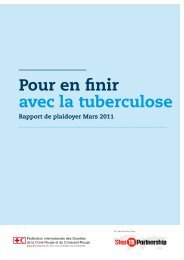Thailand - Stop TB Partnership
Thailand - Stop TB Partnership
Thailand - Stop TB Partnership
Create successful ePaper yourself
Turn your PDF publications into a flip-book with our unique Google optimized e-Paper software.
take an active role in monitoring drug quality, and should consider making an application<br />
to the Green Light Committee for internationally approved second-line drugs to better manage<br />
MDR-<strong>TB</strong>.<br />
Case recording and reporting<br />
The NTP has a comprehensive, standardized system in place for recording and reporting<br />
<strong>TB</strong> cases. In the context of staff shortages and the lack of regular refresher training courses,<br />
however, considerable delays in filing reports are not uncommon. Very few private providers<br />
comply with NTP recording and reporting guidelines.<br />
There are three <strong>TB</strong> surveillance systems. First, the MoPH collects <strong>TB</strong> case information<br />
as part of its standard communicable disease reporting system, which is sent to<br />
the Bureau of Epidemiology. Second, disease surveillance and cohort reports are submitted<br />
to the Bureau of AIDS, <strong>TB</strong> and STIs. 90 Third, cohort reports are collected quarterly, and<br />
include case-finding reports for newly registered cases, a last trimester sputum conversion<br />
rate report, and a treatment outcomes report.<br />
All health facilities use standardized recording and reporting forms for both cohort<br />
and surveillance reports, which include data on <strong>TB</strong> and <strong>TB</strong>/HIV. Provincial <strong>TB</strong> coordinators<br />
(PTCs) are responsible for consolidating district-level reports into provincial reports and<br />
submitting the information to the regional <strong>TB</strong> coordinators (RTCs), who in turn compile<br />
regional and provincial figures for the central <strong>TB</strong> Cluster.<br />
Although the surveillance and cohort reports provide useful information, recording<br />
and reporting procedures are time-consuming for clinical staff. Due to staff shortages,<br />
time constraints, and heavy workloads, clinical workers report that it is often difficult to<br />
complete their recording and reporting responsibilities on time. 91 The delay in reporting is<br />
up to one year in some areas. Due to the complexity of the forms, repeated training is also<br />
necessary, as clinical staff forget how to fill out the forms by the time the next reporting<br />
period comes around. 92<br />
Since private facilities do not rely on government funding, their patients are not<br />
required to disclose medical information to government authorities, and private providers<br />
are reluctant to spend time filling in complicated forms. Some private hospitals sign on to<br />
collaborate, but soon drop out because the reporting system is too cumbersome and timeconsuming.<br />
93 Lack of participation from the private sector makes comprehensive national<br />
record keeping and follow-up difficult.<br />
Many health workers believe a computerized system is needed to facilitate case<br />
recording and reporting, and to encourage reporting from the private sector. In 2004, the<br />
government introduced a computerized data management system and training in select<br />
provinces under the supervision of a team from the <strong>TB</strong> Cluster. According to the head of the<br />
52<br />
<strong>TB</strong> POLICY IN THAILAND


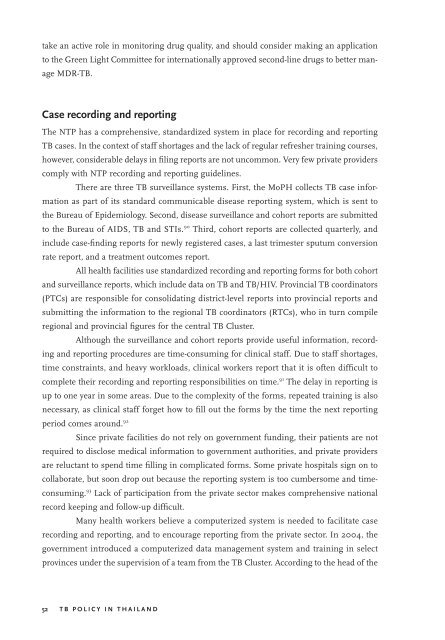
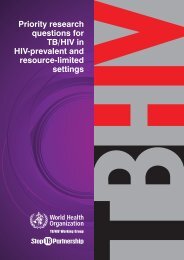
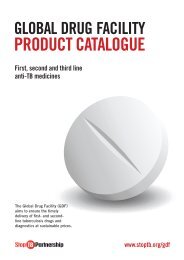
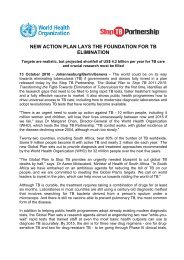
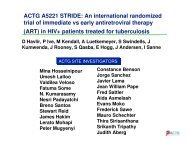
![Global Drug Facility Annual Report 2011 [.pdf] - Stop TB Partnership](https://img.yumpu.com/26788745/1/184x260/global-drug-facility-annual-report-2011-pdf-stop-tb-partnership.jpg?quality=85)

![Concept note on national stop TB partnership [.pdf]](https://img.yumpu.com/26788741/1/184x260/concept-note-on-national-stop-tb-partnership-pdf.jpg?quality=85)

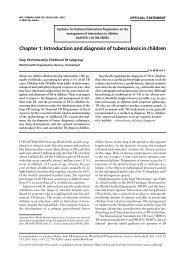
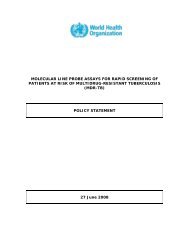
![2005 and Challenges for 2006 - 2015 [.pdf] - Stop TB Partnership](https://img.yumpu.com/26788674/1/190x245/2005-and-challenges-for-2006-2015-pdf-stop-tb-partnership.jpg?quality=85)
![Brochure (French) [.pdf] - Stop TB Partnership](https://img.yumpu.com/17234792/1/190x91/brochure-french-pdf-stop-tb-partnership.jpg?quality=85)

